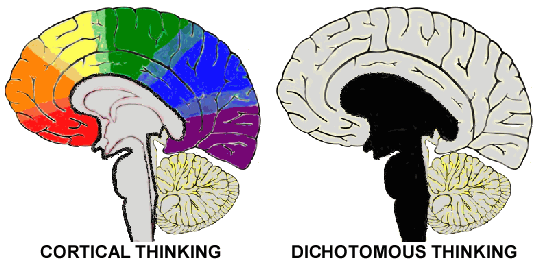A very learned individual questioned the “us vs. them” flavor of some of the posts on this blog. In the post entitled “Can we Negotiate with Iran?” I originally referred to the alleged attempt by the Iranian government to kill a Saudi diplomat on U.S. soil as “… another salvo in the ongoing war between problem-solvers and noise-makers.” I had to go back and forth many times on this issue. Was I being too dichotomous? Dichotomous thinking is a problem when it replaces needed goal-oriented thinking. There are, however, situations in which dichotomous thinking is appropriate. I am trying to encourage people, not to reject dichotomous thinking outright, but to ask “Is this dichotomy justified?” Clearly there will be times when the source of a disagreement will stem from a disagreement over whether a particular dichotomy is justified. While coming to this realization may not solve the dispute, I suggest it may still lend useful clarity to the underlying issues.
In the case of this particular post, I finally decided that there was a degree of small-mindedness on my part. While I consider the dichotomy to be extremely important, the true battle line is between the actions (problem-solving and noise making) more so than the individuals. I have since made a small modification to the post. I consider this an example of how the problem of the overuse of dichotomous thinking is a problem that can interfere with its own solution.

Fantastic line up. We are going to be linking to this excellent post on our web site. Sustain the great composing.
Arctlies like this make life so much simpler.
I love the title of this post! How fitting. I particularly enjoy your reflection that “the overuse of dichotomous thinking is a problem that can interfere with its own solution.”
I think you are on to something by suggesting that people should not reject dichotomous thinking outright, but rather ask themselves if the dichotomy is justified in the given situation. I wonder what general types of situations you believe justify dichotomous thinking. I am generally wary of dichotomous thinking (from a counseling perspective), as it often traps people from seeing the full picture and potential solutions (becoming inflexible). From a cognitive-behavior therapy perspective, dichotomous thinking is classified as a “cognitive distortion” is gently confronted and explored in therapy. It strikes me as unwise to suggest that just about anything is “always” good or “always” bad. I often look to the consequences of the patterns of thinking and examine if those results are in line with the person’s goals and underlying values. If patterns of thinking are “working” for people in healthy ways, I don’t see a reason to pull the proverbial rug out from underneath them. It is when dichotomous thinking becomes maladaptive and interferes with living a meaningful, healthy, and balanced life, that it seems worth examining.